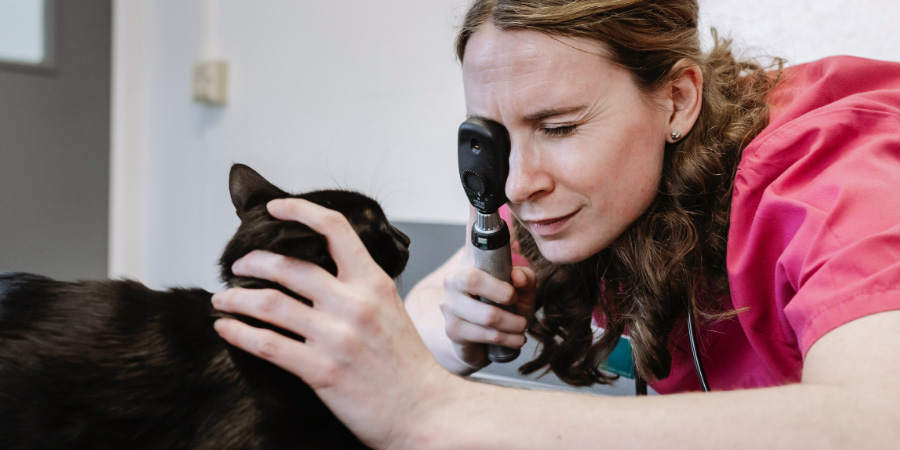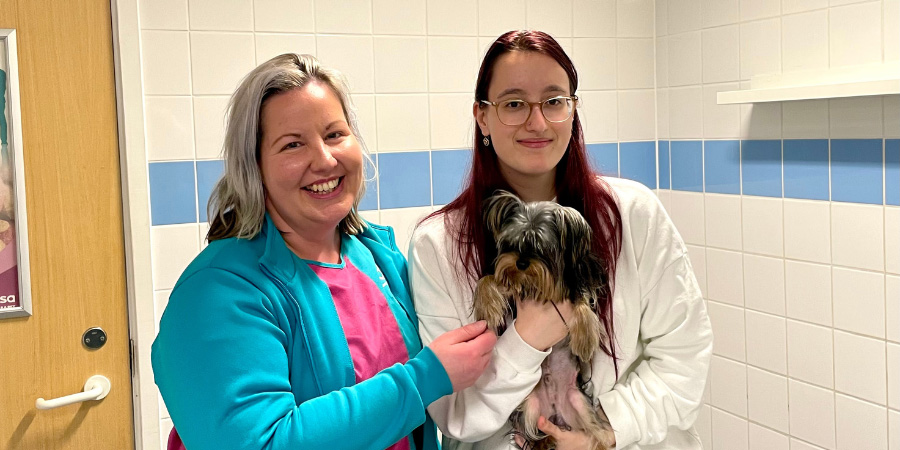Whilst there’s no denying how incredible antibiotics are in treating bacterial infections, they’re not right for every illness. It’s important that they are used correctly - we all have a part to play to help prevent bacteria becoming resistant and making infections very difficult to treat.
PDSA Vet, Emma Fisher, is on hand to answer the most pressing questions about antibiotics for cats, dogs and other pets!
Why are antibiotics so important?
Antibiotics are a vital tool for overcoming many illnesses – fighting life-threatening bacterial infections in humans and poorly pets alike. It’s easy to forget, but in the centuries before we had these essential medications, illnesses that are considered minor today were often deadly.
Luckily, as a pet owner, there are simple steps you can take to help ensure antibiotics remain an effective treatment for yourself and your four-legged family members. These include:
- Giving the correct dose of antibiotics at the right time.
- Always completing your pet’s antibiotic course (even if your pet seems better).
- Only giving your pet antibiotics that your vet has prescribed for them.
- Returning any unused antibiotics to your vet for disposal – never put them into a bin or down the toilet.
For further guidance on using antibiotics, read more on our Pet Health Hub.
How could using antibiotics be dangerous?
Antibiotics are an essential lifesaving medication for dogs, cats and other pets, but using them incorrectly can lead to dangerous consequences. Just like with humans, the more antibiotics our pets have, the increased likelihood there is of certain bacteria building up a resistance. Sadly, this may result in those bacteria no longer responding to antibiotics.
If these medicines stop working, fighting simple infections could become very difficult – even life threatening.
What is antibiotic resistance?
Antibiotic resistance occurs when bacteria finds a way to defeat the medicines they are frequently exposed to. This can lead to them becoming dangerous “superbugs”, like MRSA, which are resistant to all antibiotics – making them difficult, or almost impossible, to treat.
How can I prevent my pet from getting sick and needing antibiotics?
Sadly, it’s impossible to completely keep your pet from becoming unwell – but you can provide them with a healthy lifestyle to help prevent them getting sick. Healthy pets are better equipped to fight off infections themselves making them less likely to need medical treatment.
Therefore, it helps to make sure your furry family member is eating an appropriate diet, getting enough exercise, and is up to date with all their vaccinations. The right amount of exercise can vary depending on your pet’s breed, age, and health, but walks and playing games are all great - getting them moving regularly is key!
Why does my vet want to run tests before prescribing antibiotics?

Ultimately, your vet will want to provide the most appropriate care for your pet to help them get better as quickly as possible. In order to do this, they may need to perform tests to:
- Confirm whether there is a bacterial infection.
- Determine the most effective antibiotic.
- Rule out other potential causes (such as viral or fungal infections).
- Avoid unnecessary antibiotics to prevent overuse.
It may seem like a lot but your vet just wants to make sure that your beloved pet is getting the best treatment for them – and safeguard antibiotics for the future, so they’re available and effective for when we need them most.
Why has my vet not prescribed antibiotics?
Antibiotics should only be used when needed, as they don’t treat every disease, so they’ll only be prescribed if necessary. For example, they can't kill viruses, such as cat flu or distemper in dogs, so they would not be prescribed in this situation.
Your vet will recommend the best treatment to help your pet feel better again - but this may not always involve antibiotics.
My friend has some leftover antibiotics, can I give them to my pet?
Any medication can be harmful when not used appropriately. Drugs should only be given to the pet or human they were prescribed for, and at the time they were intended – never from a previous course.
Offering the wrong medication can make our pets very poorly and lead to them needing urgent medical treatment.
My pet seems better, can I stop the antibiotics?
Your vet will prescribe your pet the correct dosage for their weight, advise how often it should be given, and provide you with enough medication to last the full length of course that they will need.
It’s very important that you follow all instructions and don’t stop administering the medication before the course is complete, even if you think your pet seems better. If they don’t take the full round of medication, any bacteria that haven’t yet been killed have a chance to develop resistance and the drugs may no longer be effective for your pet – and potentially other animals and humans in the future.
What should I do with any antibiotics I don’t use?
It may be tempting to keep any leftover antibiotics in case of another illness – but make sure you return any antibiotics to your vet for correct and safe disposal. In the event that your pet becomes ill again, your vet will prescribe the correct medication, as those original antibiotics may not be suitable anymore.
Never put antibiotics or any other medication into the bin or down the toilet.
Antibiotics are vitally important medications
When used correctly, antibiotics are incredible as they fight against life-threatening bacterial infections in humans and poorly pets. Antibiotics, like the ones administered to 10-month-old Yorkshire Terrier pup Rufus, have saved the lives of many of our Pet Patients.
Unfortunately, Rufus needed emergency surgery at Plymouth PDSA Pet Hospital after being injured by another dog whilst on a walk. Serious dog bite wounds like he suffered carry a high risk of infection, so antibiotics were an essential part of his treatment.
Thankfully, Rufus recovered well after surgery followed by a few nights in the Pet Hospital receiving round-the-clock care. He was well enough to return home to his loving owners Marius and Anastasia, provided with pain relief, antibiotics and strict instructions for rest. He’s now been signed off from PDSA vets and even celebrated his 1st birthday with a dog-friendly birthday cake!

If you have any questions about specific antibiotics for your pet, be sure to contact your vet.
Read more about antibiotics in pets here.
Thanks to players of People’s Postcode Lottery we’re raising awareness about the importance of the responsible use of antibiotics.

